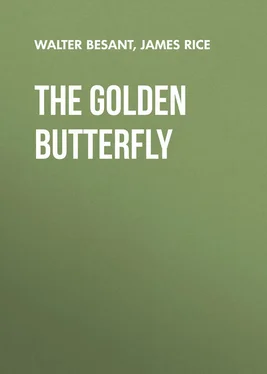Walter Besant - The Golden Butterfly
Здесь есть возможность читать онлайн «Walter Besant - The Golden Butterfly» — ознакомительный отрывок электронной книги совершенно бесплатно, а после прочтения отрывка купить полную версию. В некоторых случаях можно слушать аудио, скачать через торрент в формате fb2 и присутствует краткое содержание. Жанр: foreign_antique, foreign_prose, на английском языке. Описание произведения, (предисловие) а так же отзывы посетителей доступны на портале библиотеки ЛибКат.
- Название:The Golden Butterfly
- Автор:
- Жанр:
- Год:неизвестен
- ISBN:нет данных
- Рейтинг книги:3 / 5. Голосов: 1
-
Избранное:Добавить в избранное
- Отзывы:
-
Ваша оценка:
- 60
- 1
- 2
- 3
- 4
- 5
The Golden Butterfly: краткое содержание, описание и аннотация
Предлагаем к чтению аннотацию, описание, краткое содержание или предисловие (зависит от того, что написал сам автор книги «The Golden Butterfly»). Если вы не нашли необходимую информацию о книге — напишите в комментариях, мы постараемся отыскать её.
The Golden Butterfly — читать онлайн ознакомительный отрывок
Ниже представлен текст книги, разбитый по страницам. Система сохранения места последней прочитанной страницы, позволяет с удобством читать онлайн бесплатно книгу «The Golden Butterfly», без необходимости каждый раз заново искать на чём Вы остановились. Поставьте закладку, и сможете в любой момент перейти на страницу, на которой закончили чтение.
Интервал:
Закладка:
"I had," he explained, "a feeling of faintness. Perhaps this spring air is chilly. One cannot be too careful."
"Quite right," said the poet. "I almost think – yes, I really do feel – ah! Thank you, my dear."
The girl, as if anticipating his wants, set before him a "four" of brandy and the cold water. Perhaps she had seen the face before. As for the dog, he was lying down with his head on his paws. Perhaps he knew there would be no immediate necessity for moving.
They walked in the direction of the Park, arm-in-arm, affectionately.
It might have been a quarter of an hour after leaving the Carnarvon Arms when the poet stopped and gasped —
"Humphrey, my dear brother, advise me. What would you do if you had a sharp and sudden pain like a knife inside you?"
Humphrey replied promptly:
"If I had a sharp and sudden pain like a knife inside me, I should take a small glass of brandy neat. Mind, no spoiling the effect with water."
Cornelius looked at his brother with admiration.
"Such readiness of resource!" he murmured, pressing his arm.
"I think I see – ah, yes – Kaysar – he's gone in before us. The sagacity of that dog is more remarkable than anything I ever read." He took his small glass of brandy neat.
The artist, looking on, said he might as well have one at the same time. Not, he added, that he felt any immediate want of the stimulant, but he might; and at all times prevention is better than cure.
It was two o'clock when they returned to Carnarvon Square. They walked arm-in-arm, with perhaps even a greater show of confiding affection than had appeared at starting. There was the slightest possible lurch in their walk, and both looked solemn and heavy with thought.
In the hall the artist looked at his watch.
"Pa – pasht two. Corneliush, Work – "
He marched to the Studio with a resolute air, and, arrived there, drew an easy-chair before the fire, sat himself in it, and went fast asleep.
The poet sought the workshop. On the table lay the portfolio of papers, outside which was emblazoned on parchment, with dainty scroll-work by the hands of his brother the artist, the title of his poem:

He gazed at it fondly for a few minutes; vaguely took up a pen, as if he intended to finish the work on the spot; and then with a sigh, thought being to much for brain, he slipped into his arm-chair, put up his feet, and was asleep in two minutes. At half-past five, one of the maids – they kept no footman in Carnarvon Square – brought him tea.
"I have been dozing, have I, Jane?" he asked. "Very singular thing for me to do."
We are but the creatures of habit. The brethren took the same walk every day, made the same remarks, with an occasional variation, and took the same morning drams; they spent the middle of the day in sleep, they woke up for the afternoon tea, and they never failed to call Jane's attention to the singularity of the fact that they had been asleep. This day Jane lingered instead of going away when the tea was finished.
"Did master tell you, sir," she asked, "that Miss Fleming was coming to-day?"
It was an irritating thing that, although Cornelius ordered the dinner and sat at the head of the table, although Humphrey was in sole command of the wine-cellar, the servants always called Joseph the master. Great is the authority of him who keeps the bag; the power of the penniless twins was a shadowy and visionary thing.
The master had told his brothers that Miss Fleming would probably have to come to the house, but no date was fixed.
"Miss Fleming came this afternoon, sir," said Jane, "with a French maid. She's in Mr. Joseph's room now."
"Oh, tell Mr. Humphrey, Jane, and we will dress for dinner. Tell Mr. Humphrey, also, that perhaps Miss Fleming would like a glass of champagne to-day."
Jane told the artist.
"Always thoughtful," said Humphrey, with enthusiasm. "Cornelius is for ever thinking of others' comfort. To be sure Miss Fleming shall have a glass of champagne."
He brought up two bottles, such was his anxiety to give full expression to his brother's wishes.
When the dinner-bell rang, the brethren emerged simultaneously from their rooms, and descended the stairs together, arm-in-arm. Perhaps in expectation of dinner, perhaps in anticipation of the champagne, perhaps with pleasure at the prospect of meeting with Joseph's ward, the faces of both were lit with a sunny smile, and their eyes with a radiant light, which looked like the real and genuine enthusiasm of humanity. It was a pity that Humphrey wore a beard, or that Cornelius did not; otherwise it would have been difficult to distinguish between this pair so much alike – these youthful twins of fifty, who almost looked like five-and-twenty.
CHAPTER II
"Phillis is my only joy."
"My brothers, Miss Fleming!"
Joseph introduced the twins with a pride impossible to dissemble. They were so youthful-looking, so airy, so handsome, besides being so nobly endowed with genius, that his pride may be excused. Castor and Pollux the wrong side of forty, but slim still and well preserved – these Greek figures do not run tall – might have looked like Cornelius and Humphrey.
They parted company for a moment to welcome the young lady, large-eyed as Hêrê, who rose to greet them, and then took up a position on the hearthrug, one with his hand on the other's shoulder, like the Siamese twins, and smiled pleasantly, as if, being accustomed to admiration and even awe, they wished to reassure Miss Fleming and put her at ease.
Dinner being announced, Cornelius, the elder by a few moments, gave his arm to the young lady. Humphrey, the younger, hovered close behind, as if he too was taking his part in the chivalrous act. Joseph followed alone, of course, not counting in the little procession.
Phillis Fleming's arrival at No. 15 Carnarvon Square was in a manner legal. She belonged to the office, not to the shrine of intellect, poesy, and art created by the twin brethren. She was an orphan and a ward. She had two guardians: one of them, Mr. Lawrence Colquhoun, being away from England; and the other, Mr. Abraham Dyson, with whom she had lived since her sixth birthday, having finished his earthly career just before this history begins, that is to say, in the spring of last year. Shaw, Fairlight, and Jagenal were solicitors to both gentlemen. Therefore Joseph found himself obliged to act for this young lady when, Mr. Abraham Dyson buried and done with, it became a question what was to be done with her. There were offers from several disinterested persons on Miss Fleming's bereaved condition being known. Miss Skimpit, of the Highgate Collegiate Establishment for Young Ladies, proposed by letter to receive her as a parlour-boarder, and hinted at the advantages of a year's discipline, tempered by Christian kindness, for a young lady educated in so extraordinary and godless a manner. The clergyman of the new district church at Finchley called personally upon Mr. Jagenal. He said that he did not know the young lady except by name, but that, feeling the dreadful condition of a girl brought up without any of the gracious influences of Anglican Ritual and Dogma, he was impelled to offer her a home with his Sisterhood. Here she would receive clear dogmatic teaching and learn what the Church meant by submission, fasting, penance, and humiliation. Mr. Jagenal thought she might also learn how to bestow her fortune on Anglo Catholic objects when she came of age, and dismissed his reverence with scant courtesy. Two or three widows who had known better days offered their services, which were declined with thanks. Joseph even refused to let Miss Fleming stay with Mrs. Cassilis, the wife of Abraham Dyson's second cousin. He thought that perhaps this lady would not be unwilling to enliven her house by the attraction of an heiress and a débutante . And it occurred to him that, for a short time at least, she might, without offending a censorious world, and until her remaining guardian's wishes could be learned, take up her abode at the house of the three bachelors.
Читать дальшеИнтервал:
Закладка:
Похожие книги на «The Golden Butterfly»
Представляем Вашему вниманию похожие книги на «The Golden Butterfly» списком для выбора. Мы отобрали схожую по названию и смыслу литературу в надежде предоставить читателям больше вариантов отыскать новые, интересные, ещё непрочитанные произведения.
Обсуждение, отзывы о книге «The Golden Butterfly» и просто собственные мнения читателей. Оставьте ваши комментарии, напишите, что Вы думаете о произведении, его смысле или главных героях. Укажите что конкретно понравилось, а что нет, и почему Вы так считаете.












